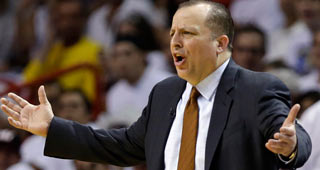The executive-coach hybrid experiment has yet to work out in the modern NBA. In theory, it’s giving the guy who most intimately understands the franchise’s roster the power to acquire precisely the talent he thinks he needs, but in reality, it’s saddling one person with two discrete jobs, each of which require around-the-clock commitment. Why would a talent for strategizing and teaching make someone good at navigating the sharper corners of the league’s collective bargaining agreement or working an opposing front office for an extra asset in a trade? And, even if it did, who has the time to do both?
Doc Rivers is too busy prepping his team for their weekly handful of games to properly scout the D-League and the end of other teams’ benches, so he has regularly tried to plug holes in the Clippers’ rotation with players who peaked in 2012. Heading into his fourth year as the decider-in-chief in Detroit, Stan Van Gundy is being urged by Pistons fans to either further empower general manager Jeff Bower or hire somebody else for the gig because Stan’s not getting it done personnel-wise. Gregg Popovich holds the Spurs’ President of Basketball Operations title, but shortly after he kicked himself downstairs to the sidelines in 1996, he installed R.C. Buford beneath him to handle San Antonio’s wheeling and dealing. Pop has been the best combination suit/tactician since Red Auerbach because he knows the jobs are impossible to do simultaneously, so he delegates ninety percent of it while retaining final say on all transactions.
All that evidence suggests Tom Thibodeau is due for an eye-roller of a contract or a ruinous trade in the near future, but he’s been surprisingly competent as an exec-coach so far in Minnesota. While the Wolves didn’t immediately soak up all the abstruse instruction he gave them last season—as I wrote last October, defense takes a while to learn—they’re going to compete for a playoff spot and perhaps even make a moderately deep postseason run next year due to Thibodeau’s front office acumen. Last summer, while most of the rest of the league was handing out eight- and nine-digit deals as if the salary cap was going to go on skyrocketing forever, Thibs signed Brandon Rush, Jordan Hill, and Cole Aldrich to modest, short-term contracts—Rush and Hill are already gone; Aldrich is non-guaranteed in 18-19—and worked out a fairly priced extension for Gorgui Dieng. Instead of scrambling to improve a squad he was just getting to know, he stayed prudent and kept his options open.
This offseason, having all the information he needed about Kris Dunn and Zach LaVine, he sent them to Chicago along with a mid-lottery pick for Jimmy Butler in what’s been characterized by most as an absolute fleecing. Thibodeau’s other moves haven’t been bad either. His insistence on shipping Ricky Rubio out—Rubio can’t shoot, but he’s a terrific passer and one of the Wolves’ only above-average defenders—was curious, but he got decent value for the Spaniard by flipping him to Utah for a lottery-protected first-rounder. And bringing aboard Jeff Teague as Rubio’s replacement is a solid decision. Teague will boost Minny’s offense and he’s signed for the next three seasons at an average of $19 million per year. He’ll be 31 when his contract is up, which is just about when slashing point guards like him begin to decline. Taj Gibson for two years and $28 million? It’s a whit Doc Riversonian, but it’s only two years and Gibson isn’t done as a useful player.
What we tend to worry about most with executive-coaches is that they’ll sink themselves with short-term thinking. Granted, some general managers do this too, but it seems that coaches get especially restless with regards to bringing along young players and losing a bunch of games in the process. Thibs, after a rough first season with the whistle around his neck, has taken this offseason to swing the A-plus Butler coup, but also to incrementally improve the Wolves with veterans without screwing up their cap or needlessly dealing away lottery picks or promising prospects for sure-thing thirty-year-olds.
The Wolves are quite a bit more talented than they were a year ago, and could create significant cap space next summer by waiting to extend Wiggins to keep him on his lower cap hold before re-signing him, minus Aldrich’s non-guaranteed salary, and possibly trading away the contract of Dieng. Additionally, any exceptions they want to use once they re-sign Wiggins and go over the cap. Thibs can coach up this souped-up roster in 17-18, see where he’s at, and have a decent degree of flexibility to make adjustments afterwards.
Obviously, there’s a lot of work left to do. The Wolves won 31 games last year. But Karl-Anthony Towns is a star at 21. Jimmy Butler is one of the best fifteen players in the league. Teague and Gibson have parts to play and will function as adults in the locker room. Wiggins is a frustrating yet immensely gifted young player. The Wolves haven’t figured everything out, but they’re on the right track.
If this sounds like slightly faint praise, it’s because there was a decent chance Thibodeau the exec was going to sabotage Thibodeau the coach. We’ve seen it happen before, and hell, on his way through the door, he hired former Knicks pariah Scott Layden to work beneath him as general manager. That was a bad sign right at the start. But however much Thibs is delegating and however much he’s involved in day-to-day personnel management, it’s the correct amount. After a little more than a year in charge, he’s got the Wolves ready to pivot toward playoff contention. They’re exactly where they want to be at the moment, and they’re set up well to pursue grander ambitions further down the road.



